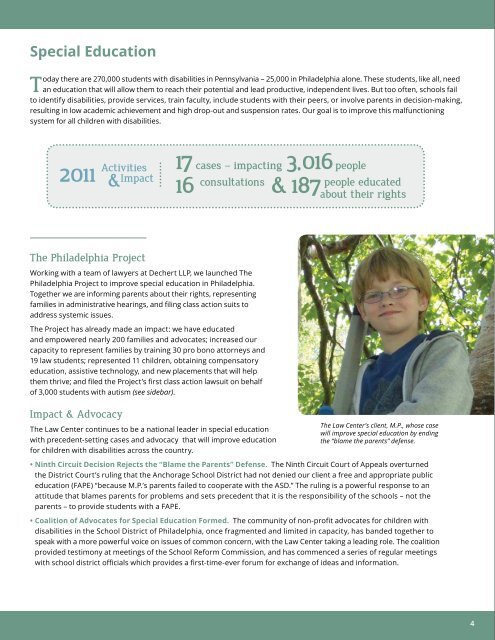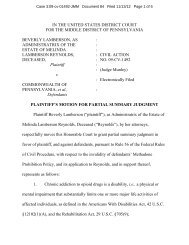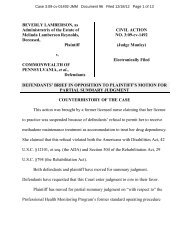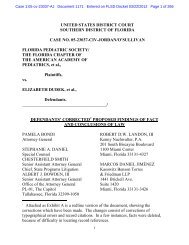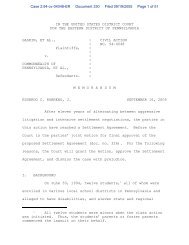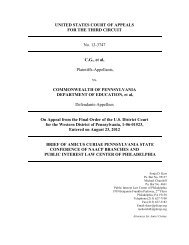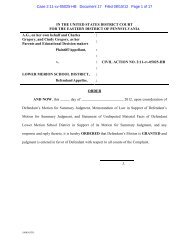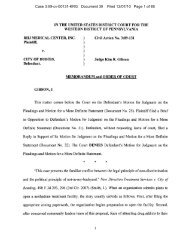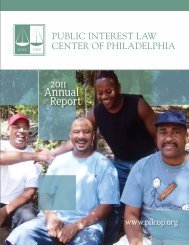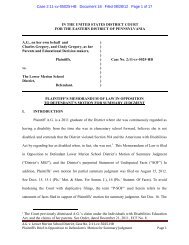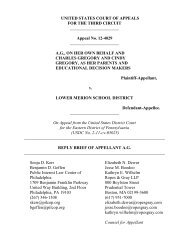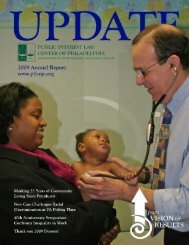2011 Annual Report - Public Interest Law Center of Philadelphia
2011 Annual Report - Public Interest Law Center of Philadelphia
2011 Annual Report - Public Interest Law Center of Philadelphia
You also want an ePaper? Increase the reach of your titles
YUMPU automatically turns print PDFs into web optimized ePapers that Google loves.
Special Education<br />
Today there are 270,000 students with disabilities in Pennsylvania – 25,000 in <strong>Philadelphia</strong> alone. These students, like all, need<br />
an education that will allow them to reach their potential and lead productive, independent lives. But too <strong>of</strong>ten, schools fail<br />
to identify disabilities, provide services, train faculty, include students with their peers, or involve parents in decision-making,<br />
resulting in low academic achievement and high drop-out and suspension rates. Our goal is to improve this malfunctioning<br />
system for all children with disabilities.<br />
<strong>2011</strong> Activities<br />
& Impact<br />
The <strong>Philadelphia</strong> Project<br />
Working with a team <strong>of</strong> lawyers at Dechert LLP, we launched The<br />
<strong>Philadelphia</strong> Project to improve special education in <strong>Philadelphia</strong>.<br />
Together we are informing parents about their rights, representing<br />
families in administrative hearings, and filing class action suits to<br />
address systemic issues.<br />
The Project has already made an impact: we have educated<br />
and empowered nearly 200 families and advocates; increased our<br />
capacity to represent families by training 30 pro bono attorneys and<br />
19 law students; represented 11 children, obtaining compensatory<br />
education, assistive technology, and new placements that will help<br />
them thrive; and filed the Project’s first class action lawsuit on behalf<br />
<strong>of</strong> 3,000 students with autism (see sidebar).<br />
Impact & Advocacy<br />
17 cases – impacting 3,016 people<br />
16 consultations &187<br />
The <strong>Law</strong> <strong>Center</strong> continues to be a national leader in special education<br />
with precedent-setting cases and advocacy that will improve education<br />
for children with disabilities across the country.<br />
people educated<br />
about their rights<br />
The <strong>Law</strong> <strong>Center</strong>’s client, M.P., whose case<br />
will improve special education by ending<br />
the “blame the parents” defense.<br />
• Ninth Circuit Decision Rejects the “Blame the Parents” Defense. The Ninth Circuit Court <strong>of</strong> Appeals overturned<br />
the District Court’s ruling that the Anchorage School District had not denied our client a free and appropriate public<br />
education (FAPE) “because M.P.’s parents failed to cooperate with the ASD.” The ruling is a powerful response to an<br />
attitude that blames parents for problems and sets precedent that it is the responsibility <strong>of</strong> the schools – not the<br />
parents – to provide students with a FAPE.<br />
• Coalition <strong>of</strong> Advocates for Special Education Formed. The community <strong>of</strong> non-pr<strong>of</strong>it advocates for children with<br />
disabilities in the School District <strong>of</strong> <strong>Philadelphia</strong>, once fragmented and limited in capacity, has banded together to<br />
speak with a more powerful voice on issues <strong>of</strong> common concern, with the <strong>Law</strong> <strong>Center</strong> taking a leading role. The coalition<br />
provided testimony at meetings <strong>of</strong> the School Reform Commission, and has commenced a series <strong>of</strong> regular meetings<br />
with school district <strong>of</strong>ficials which provides a first-time-ever forum for exchange <strong>of</strong> ideas and information.<br />
Client Impact<br />
Janelle 1 is a fourteen year-old with multiple<br />
disabilities, including partial hearing loss.<br />
Although law requires schools to identify<br />
children with disabilities, no one at her district<br />
had tried to identify her, even after she<br />
did not pass a hearing test. Instead, she<br />
was sent to disciplinary school. After the<br />
<strong>Law</strong> <strong>Center</strong> and Dechert filed a complaint,<br />
the district agreed to an independent evaluation<br />
that identified her disabilities and<br />
sent her back to her home school, where,<br />
with the assistance <strong>of</strong> technology, she is<br />
now able to hear her teachers and benefit<br />
from her education.<br />
Autism Class Action Case<br />
There are 3,000 students with autism<br />
in <strong>Philadelphia</strong>, most <strong>of</strong> who spend part <strong>of</strong><br />
their school day in an Autism Support (AS)<br />
classroom. However, because AS rooms<br />
are scattered around the District, students<br />
with autism are shuffled between schools<br />
while their non-disabled peers are not.<br />
Malik and Pedro, both<br />
third-graders, are just<br />
two students affected<br />
by this policy; after<br />
being segregated in an<br />
over-crowded AS room,<br />
the District proposed to<br />
transfer them without<br />
any plan or notification.<br />
Through an administrative<br />
hearing, the <strong>Law</strong><br />
<strong>Center</strong> was able to<br />
obtain compensatory<br />
education and halt their<br />
transfers. When the<br />
hearing <strong>of</strong>ficer said he<br />
did not have the power to fix the problem<br />
for all children in <strong>Philadelphia</strong>, we filed a<br />
federal class actionlawsuit. Trial is scheduled<br />
for summer 2012.<br />
1 Names have been changed<br />
to protect privacy.<br />
4 5 www.pilcop.org<br />
The four plaintiff<br />
students, ages 8 and 9.<br />
Housing<br />
In Pennsylvania alone there are 1,000 people with<br />
disabilities still confined to state-run institutions<br />
despite having the right — established over decades<br />
<strong>of</strong> <strong>Law</strong> <strong>Center</strong> cases — to live in the community with<br />
needed services. Fear and discrimination also lead<br />
to zoning laws that would restrict the location <strong>of</strong><br />
housing for the elderly, those struggling with addiction,<br />
and people with disabilities to secluded areas. The<br />
<strong>Law</strong> <strong>Center</strong>’s goal is to end housing practices that<br />
unnecessarily segregate and to advocate for the full<br />
inclusion <strong>of</strong> all members in society.<br />
<strong>2011</strong> Activities<br />
&Impact cases – impacting 6 people 9,651<br />
An End to Institutionalization for<br />
People with Disabilities in Illinois<br />
In January <strong>2011</strong>, a settlement was reached in the case<br />
<strong>of</strong> Ligas v. Maram that will greatly expand community<br />
living options for people with disabilities in Illinois.<br />
People with disabilities currently living in Intermediate<br />
Care Facilities will have the choice to move into community<br />
living arrangements with necessary supports.<br />
In addition, 3,000 people already living in the community<br />
will now be able to receive supports they currently lack.<br />
Advocating for Change<br />
Michael Churchill testified before <strong>Philadelphia</strong> City<br />
Council in opposition to zoning changes that would<br />
ban group homes for people with disabilities from<br />
residential areas and methadone clinics from areas<br />
in which other medical treatment facilities are allowed<br />
to operate. Both changes, which seek to segregate, are<br />
in clear violation <strong>of</strong> state and federal law and blatantly<br />
discriminate against already-vulnerable populations.


